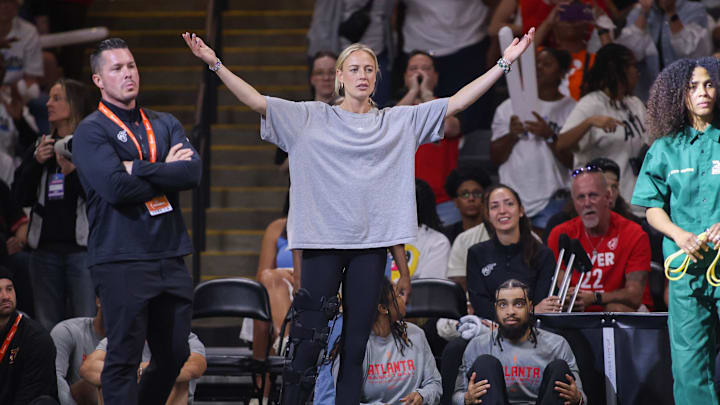In her season-ending exit interview Thursday, Indiana Fever’s Sophie Cunningham condemned both officiating and league leadership, declaring that many in positions of power “don’t know s-t about basketball” and called for accountability from top to bottom. “I’m not really a fan of our leadership. They’re failing us as a league, definitely failing us as players,” she said.
Her comments arrive during what should be the league’s high-water mark. The WNBA just completed a season of record attendance, unprecedented television ratings, and global attention thanks largely to key players including Caitlin Clark, Paige Bueckers, and Angel Reese. But beneath the surface, frustration among players continues to spill out publicly regarding league leadership and Commissioner Cathy Englebert.
“I’m just tired of our league”
The spark came earlier this week, when Minnesota’s Napheesa Collier alleged that Commissioner Cathy Engelbert believes that Caitlin Clark should be “grateful” for the WNBA’s platform, despite the fact that Clark’s presence has boosted revenue and visibility for the league. Collier called it an insult and labeled league leadership “the worst in the world.”
Cunningham echoed that frustration and took aim at Engelbert personally, “It’s pretty shameful she always makes it about her, Cathy, when it should have nothing to do with her.” The broader message is clear: players no longer feel leadership is aligned with them and they’re willing to say so with the understanding that free speech is not free.
Cunningham has voiced her support of Clark in prior comments, defending her publicly amid criticism as well as protecting her on the court. In Clark’s exit interview, she said she backs Collier’s call for strong leadership and acknowledged the weight of this moment in league history. She stressed, “We need great leadership in this time across all levels.” Together, these statements show a fracturing alignment between players and league executives, particularly ahead of the collective bargaining discussions.
#Mizzou legend Sophie Cunningham spoke on the state of the WNBA during her exit interview today: "Our leadership from top to bottom needs to be held accountable."
— Nathalie Jones (@NathalieABC17) October 2, 2025
Worth a listen ⬇️ https://t.co/tkdvK6VfDG
The lockout warning
Cunningham raised the possibility of a work stoppage if the next CBA doesn’t deliver real change. She warned, “I promise you we aren’t going to play until they give us what we deserve … which would be the dumbest basketball decision, business-wise ever, considering the momentum the ‘W’ has.” That’s not hyperbole. That’s a lockout threat.
The current deal, signed in 2020, gave players improved salaries, maternity benefits, and travel upgrades. But with the league surging in popularity, players now want and expect a bigger slice of the pie. Revenue sharing, charter flights, and better pay structures are at the top of that list. The WNBA is riding unprecedented momentum thanks to Caitlin Clark, Angel Reese, and the infusion of new stars. A lockout during this growth spurt would be catastrophic for the league’s image, sponsors, and broadcast partners. This places massive public pressure not just on Engelbert, but on the league’s corporate stakeholders to act before negotiations get ugly.
What this means going forward
League leadership will have to respond, or the divide will widen further. The next steps in officiating reform, communication transparency, and labor negotiation will show whether the WNBA can adapt or if this becomes another era of friction between those who play and those who govern.
The WNBA is in a paradoxical place. The league is more popular than ever, yet facing a trust gap with its own players. While Engelbert and the league have delivered expansion plans, corporate sponsorships, and record ratings, many players feel those gains haven’t translated into respect, resources, or fair treatment. In parallel to U.S. Soccer’s equal-pay fight, the stakes become even clearer. If players unify as they are now, change is inevitable.
